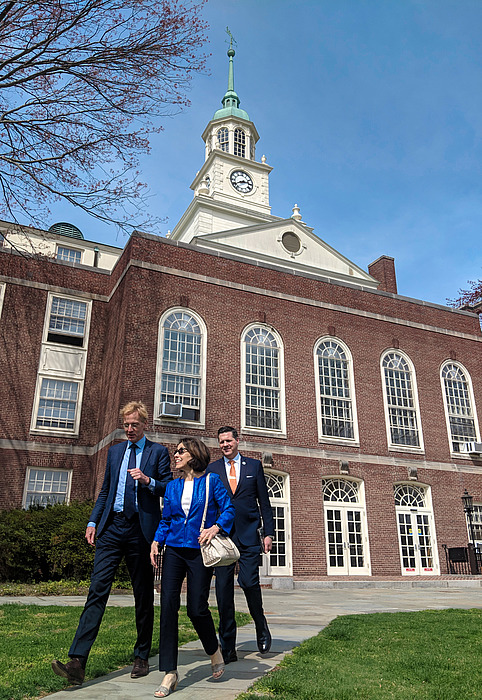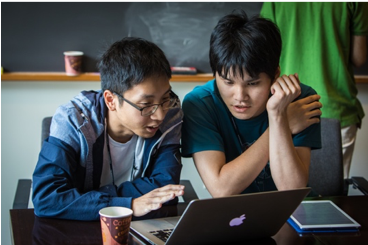A Launchpad to Discovery

“The future of knowledge relies on the cultivation of aspiring scholars and scientists from around the world,” says Robbert Dijkgraaf, IAS Director and Leon Levy Professor. “The partnership between IAS and NSF is a primary engine of discovery that continues to empower scholars by providing the space, time, and resources needed to take intellectual risks, advance professionally, and illuminate the unknown.”
After its founding in 1950, the National Science Foundation (NSF) quickly became an indispensable champion of scientific progress. At this time, the Institute for Advanced Study (IAS)—established in 1930, with Abraham Flexner as founding Director—was already a global hub for curiosity-driven basic research. A natural alliance was immediately forged, and the results have proved to be astounding.
Some of the most remarkable breakthroughs of the 21st century took place on the watch of Dr. France Córdova, who was sworn in as NSF Director in April 2014. These achievements include the first detection of gravitational waves and the first picture of a black hole, based on ideas first conceived of by Albert Einstein, a founding member of the IAS Faculty.

Another fellow featured in the essay was Allen Devinatz, who retired as an Emeritus Professor of Mathematics at Northwestern University. Devinatz recalled in 1999, “I went to the Institute [for Advanced Study] where I found the atmosphere both relaxed and friendly. I met some of the leading mathematicians of the century.... Thus the awarding of an NSF post-doc in 1952 had a positive influence on my life and career. It changed my thinking by realizing that most of the mathematicians whom I had come in contact with were decent people, and that there was a place for me in the academic mathematical community.”
As the NSF celebrates its 70th anniversary, the IAS is proud to share #NSFStories from the next generation that attest to and uphold this great tradition of discovery. The following testimonials are from scholars who received funding based on an NSF award while at IAS.

While at the Institute, Nelson’s work focused on crafting tools to efficiently analyze massive data sets related to internet activity. “Data is streaming by—such as queries to a search engine or purchases from an online vendor—and one wants to process this data as it streams by using very little memory while still being able to answer nontrivial queries about the data stream,” Nelson explained.
The Institute proved a fertile environment for collaboration on this subject. Working with the late mathematician and IAS Professor Jean Bourgain and Sjoerd Dirksen, Nelson conducted a project on dimensionality reduction that resulted in a paper published in the Symposium on the Theory of Computing 2015 and in Geometric and Functional Analysis later that same year. Additionally, Nelson’s collaboration with Huy Nguyen, a graduate student at Princeton University, resulted in four separate publications on streaming algorithms and dimensionality reduction. The two now have a joint grant together and have published two more papers.

Not only was this a very productive period for Schwartz—which included proving his spherical CR surgery theorem—but it was also an opportunity to explore new areas of research. “I was able to accomplish a lot of what I set out to do, I then was able to switch gears and a make a big change in my research. Shortly after leaving IAS I started working on more dynamical things like inner and outer billiards,” Schwartz added.
In September 2020, Schwartz will return to IAS as a Member, 17 years following his first term. The sense of family and an environment ripe with research opportunities sees many scholars returning to IAS over the course of their careers. Perhaps one of Schwartz’s happiest surprises from his time at IAS was the effect on his daughter Lucina, who was then 6 years old. “Lucina fell in love with Princeton and decided shortly thereafter that she wanted to go to Princeton University for college. She kept her decision a secret from us until she actually got admitted. She graduated from Princeton in 2019, summa cum laude, with an English degree.”

“The first time I spent a year at the IAS, I had just finished my Ph.D., and I received an NSF postdoc to work at the IAS,” Pierce explained. “That year I talked a lot with Peter Sarnak, and one particular question he asked me has unexpectedly developed into one of the major arcs of my last ten years of research. I wasn't able to answer the question at the time, but I carried it with me, and eventually it led to several new papers. It was one of those questions that opens a whole new way of thinking about a tough problem, and I feel so lucky that I had an office just down the hall from Peter Sarnak, and so he called me in to talk about it.”
Pierce’s experience underscores the long-term impact of studying at IAS, not only in terms of informing one’s own research, but also in the dissemination of knowledge to institutions around the world. “I always look forward to a chance to stop by the IAS and check in with Peter Sarnak, to tell him of any progress, and to hear new stimulating feedback. This is one of the most important mentoring relationships I have ever had, and I think it all crystallized because of my NSF postdoc at the IAS.”
IAS Outreach Programs Supported by NSF
The IAS is committed to fostering an inclusive environment for scholars, and is uniquely able to provide a single space to inspire rising graduate students, to enrich the experience of recent postdocs, and to stimulate new paths of research for the world's foremost scholars. The following initiatives have been supported through direct funding from the NSF.
Women and Mathematics (WAM) — An award-winning program that encourages female mathematicians to form collaborative research relationships and to become active in a vertical mentoring network spanning a continuum from undergraduates to emerita professors, which provides support and reduces the sense of isolation experienced by many women in mathematics.
Chuu-Lian Terng and 2019 Abel Prize Laureate Karen Uhlenbeck first came to IAS in 1979 as Members in the School of Mathematics, and they founded the program at the Institute in 1994. In a note regarding the program, Uhlenbeck wrote, "Participants at every level in the Women's Program find the experience of working with other serious women and gaining access to the network of female mathematicians not only rewarding and useful, but enjoyable as well."
Cancer Convergence Education Network (CCEN) — An NSF–sponsored program led by Arnold J. Levine, Professor Emeritus in the School of Natural Sciences and founding head of the IAS Simons Center for Systems Biology, that aims to create a network of graduate students, postdoctoral researchers, and clinical fellows to investigate questions at the interface of the physical and mathematical sciences and biology.


Several participant responses spoke to the value of this program:
Mingyu Yang, a postdoctoral associate in Fan lab at the Yale University Department of Biomedical Engineering, recalled, “Firstly, the lectures were so diverse and I really learned a lot from the discussions with the lecturers and other professors at IAS. Secondly, though I started my postdoc research at Yale more than 6 months ago, I am still in the process of transitioning between the role shift from a graduate student to a postdoc, and in this aspect, I gained insight through my interactions with other postdocs and graduate students.”
Junfei Zhao, a postdoctoral research scientist in the Department of Biomedical Informatics at Columbia University, stated, “My own research focuses on cancer genomic data analysis and tumor evolution. So, my favorites in the course were the cancer immunology related talks from which I learned some new ideas. This course also provided us a great opportunity to interact with scholars from different backgrounds. In this process, I learned how other people interpreted the same problem from different point of view I had never heard of before.”
Elena Bonazzoli, Research Associate at the Yale University Department of Obstetrics, Gynecology & Reproductive Sciences, noted with regard to the program, “This will surely improve my future work in research. I confidently believe the collaboration with physicists to explore problems in biology will result in leaps of fundamental understanding of evolution and basic biological processes.”
Heidie Frisco Cabanos, a Research Fellow in the Hata Lab, Center for Cancer Research at Massachusetts General Hospital/Harvard Medical School, stated, “When I went back to our lab after the conference I met up with my PI (Dr. Aaron Hata) and discussed some of the ideas that I generated during the conference. We are now starting a new project based from these ideas.”

Since the 1980s, meetings in the Strings series have been focal points of the field, with experts from around the world presenting new work and reviewing recent developments. These meetings have a very broad focus, including string theory, its relations to quantum field theory and other areas of physics, the associated mathematics and mathematical physics, and potential applications to particle physics and cosmology.